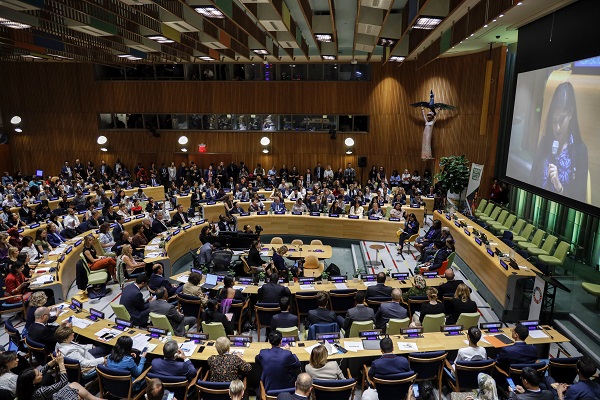Madrid, India will highlight its achievements in climate action during the ongoing UN Climate Change Conference (COP25) negotiations in the Spanish capital on Monday.
This comes as part of the processes set up in 2010 to enhance transparency in addressing climate change.
The so-called multilateral assessment for developed countries and facilitative sharing of views (FSV) for developing countries provide multilateral fora for countries to showcase their achievements in climate action and engage in a constructive exchange of views.
Both the multilateral assessment and facilitative sharing of views processes serve as foundations of the enhanced transparency framework under the 2015 Paris Climate Change Agreement, which represents an important component of increasing ambition to tackle climate change by building trust and confidence that countries are taking actions.
In the facilitative sharing of views, Indian along with five developing countries — Chile, Ghana, Malaysia, and Saudi Arabia — will present updates on climate actions and what is needed to strengthen their capacities.
Climate negotiators say an increasing number of developing countries, including the least developed countries and small island developing states, have been stepping up their efforts to strengthen climate transparency by providing updated information every two years and participating in the international process to have them analysed.
Chile is the first, and until now the only country to participate in the facilitative sharing of views for the third time, which underscores the country’s efforts to strengthen climate transparency.
At the multilateral assessment, 10 developed countries – Austria, Belgium, Bulgaria, Cyprus, Greece, Kazakhstan, Luxembourg, New Zealand, Portugal and Switzerland a” will present their actions to meet their 2020 climate targets.
Countries under the multilateral assessment will be sharing their achievements, innovative climate actions and experiences in meeting the 2020 climate targets.
Among those achievements is New Zealand’s recently passed “zero carbon” law that aims to make the country almost carbon neutral by 2050.
The multilateral assessment process also allows all 197 Parties to the UN Framework Convention on Climate Change (UNFCCC) to ask questions to clarify a country’s emission reduction actions and greenhouse gas trends and projections, based on the national reports and their review reports.
Both the processes help expand the knowledge base and build trust in addressing climate change as they enable countries to better understand where they are in terms of climate actions and how to prioritize further actions and support.
Indian Minister of Environment, Forest and Climate Change Prakash Javadekar, who is leading the delegation in the high-level segment of COP25, told this visiting IANS correspondent that India is participating with a constructive and positive outlook and working towards protecting long-term development interests.
“In the last four years, India is leading from the front in Climate Action. Prime Minister Narendra Modi was first to propose Solar Alliance and Coalition for Disaster Resilient Infrastructure,” he said.
“India’s ambitious renewable energy program of 450 GW has attracted world attention as it is the largest renewable programme in the world,” he said, adding “we are one of the few countries which has increased tree cover in and outside forest.”
According to Javadekar, who reached here on Saturday, India has reduced its emission intensity by 22 per cent over 2005.
The Indian Union Cabinet, chaired by Modi, in the run-up to COP25 approved the negotiating stand of India.
India’s approach will be guided by principles and provisions of UNFCCC and the Paris Agreement, particularly the principles of equity and common but differentiated responsibilities and respective capability (CBDR-RC).
COP25 is an important summit as countries prepare to move from pre-2020 period under the Kyoto Protocol to post-2020 period under the Paris Agreement.
In addition to International Solar Alliance, two new initiatives have been launched by India as part of its efforts to mobilize world on climate action.
These include Coalition for Disaster Resilient Infrastructure, which will serve as a platform to generate and exchange knowledge on different aspects of climate and disaster resilient infrastructure and Leadership Group for Industry Transition launched jointly by India and Sweden, which will provide a platform for government and the private sector in different countries to work together on accelerating low carbon growth.
India has been ambitious in its actions and has emphasized that developed countries should take lead in undertaking ambitious actions and fulfil their climate finance commitments of mobilizing $100 billion per annum by 2020 and progressively and substantially scale up their financial support to inform Parties for future action through nationally determined contributions (NDCs).
Indian negotiators told IANS that at the two-day high-level talks beginning on December 10 India will further stress upon need for fulfilling pre-2020 commitments by developed countries and that pre-2020 implementation gaps should not present an additional burden to developing countries in the post-2020 period.
According to Climate Risk Index 2020, an annual report by Germanwatch released here last week, India has also been badly affected by climate change, ranking fifth in the overall global vulnerability index in 2018, ranked first in terms of fatalities and second in the world in terms of losses in millions of dollars.
India’s overall ranking has drastically fallen from 14th in 2017, to fifth in 2018.










